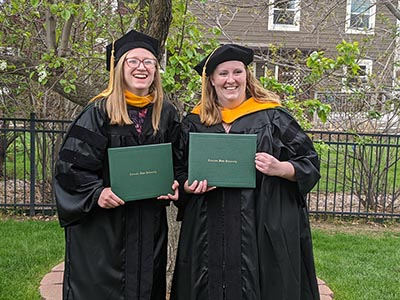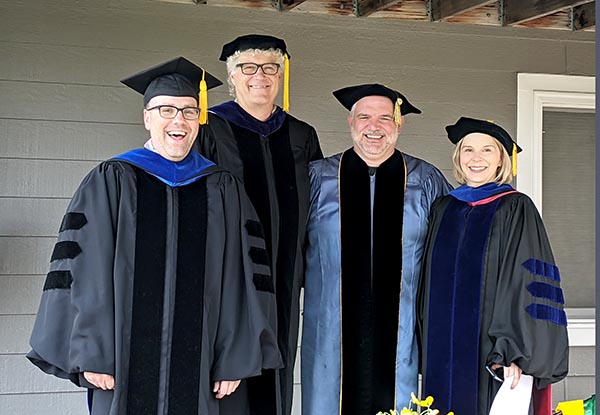Congratulations to the Department of Communication Studies first Ph.D. cohort.

Emily Amedée, Jordin Clark, Andy Gilmore, Hailey Otis, and Kristin Slattery began their journey through the communication doctoral program fall semester 2017. The cohort has published their research in highly regarded scholarly journals, won prestigious awards, and developed robust teaching portfolios.
All are on track to complete their degrees in 2021, which puts them under the 5-year national average for completing a Ph.D. program in the communication studies discipline.
“These outcomes are remarkable for a brand-new Ph.D. program, and are a testament to the talent and hard work of our graduate students, as well as to the innovative design of our program,” says Department of Communication Studies Director of Graduate Programs and Professor Kari Anderson.
Despite a global pandemic creating a significantly strained and job market, all students in the graduating cohort have secured positions in higher education. secured positions in higher education.
Anderson and department faculty designed the Ph.D. in Communication to be a flexible yet rigorous program that focuses on developing excellence in teaching, writing, and research within a highly collaborative and supportive community.
“What drew me to the program was the department’s commitment to developing well-rounded scholars – not just people who publish,” says Clark.
Students develop and explore their interests across the three areas of specialization that organize faculty expertise: film and media studies, relational and organizational communication, and rhetoric and civic engagement.
“We inherently value coming to our discipline from many different angles,” says Amedée. “Because we have such a diverse faculty and diverse set of interest in our department that has helped me see more of my own experiences within the discipline and thrive.”

As a result of students not being siloed into one specific area, Anderson says, doctoral students pursued and engaged in transformative research and teaching around diverse and intersecting topics. These pursuits have been aided by an innovative curriculum that includes coursework in pedagogy, professional development, academic writing, and public scholarship.
“We just completed our recruiting cycle for students beginning next fall—every single one of our top recruits accepted our offer,” Anderson says. “Our PhD program launch has been phenomenally successful thanks to engaged and caring faculty members, a close-knit and hardworking cohort of graduate students, and staff members dedicated to supporting the program and our students. I couldn’t be more proud to be a CSU Ram!”
For Anderson, celebrating the graduation of the first crop of Ph.D. students in communication studies is a dream come true. She received her M.A. in Commuication Studies from CSU at a time when department faculty weren’t strongly interested in developing a Ph.D. program. Anderson left the state to pursue her doctorate, despite wanting to stay in Colorado.
She says, “The fact that I was able to return as a tenure-track faculty member and help develop a Ph.D. illustrates how much our program, which has had a highly regarded MA program for decades, has grown in the last 10 years.”